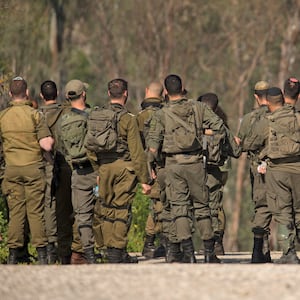MAJD-AL-ZOUN, Lebanon—“If we went to an all-out war, it would be the end of both Lebanon and Israel,” said a Hezbollah fighter in the battlefields of South Lebanon ominously.
While some in Iran and Israel seem hellbent on escalating the current Middle East conflict, the normally aggressive Hezbollah militia has been notably reticent to use its heavier weaponry and missiles in the aftermath of Oct. 7. That puts the militants—who themselves are heavily-funded by Iran—in a notably different position to their backers in Tehran, who launched an unprecedented aerial assault on Israel at the weekend.
The Daily Beast was granted rare access to Hezbollah controlled towns on the Lebanese-Israeli border shortly before that attack, and the difference in attitudes was stark.
On the surface, the orange groves and ancient Phoenician ruins of the city of Tyre look like they would make an attractive tourist spot, but the picturesque scenery hides one of the world’s most formidable arsenals. Any of the fruit trees could have a rocket launcher or missile hiding between its leaves. In total, the group is believed by U.S. and Israeli intelligence to possess up to 150,000 rockets.
Some believe a full-scale launch could quickly overwhelm Israel’s Iron Dome and David’s Sling defense systems. Yet for now, both sides have limited their attacks. Hezbollah initiated the first wave of rocket attacks on Oct. 8, in support of Hamas’s fight in Gaza. “The military actions we're taking now are to support our allies in Hamas, so they’re not alone against Israel,” says the Hezbollah fighter codenamed Hajj. “Israel is our enemy” he says, pausing to consider his words… “But this is not our war.”
In one of the biggest barrages since the Hamas attack on Israel last October, Hezbollah fired around 40 missiles across the border on Saturday, but no one was killed.
On the surface, Hezbollah and Hamas seem ideal allies—both are Islamist groups that say they are devoted to the destruction of the state of Israel. But a closer look reveals significant differences between the two groups’ practices. Because Hezbollah is considered the strongest non-state military in the world, the stakes of a war here are much higher.
Two explosions sounded in the background, and a drone hummed overhead, a quiet day by the standards of South Lebanon, where a low-level conflict has simmered. The tinderbox is waiting to be set alight. “Hezbollah is probably using only a small fraction of their weapons so far, maybe just some old ones they don't really want anymore… In fact, the weapons they've used until now don't even amount to 5 percent of their capabilities,” Hajj says, comparing the situation between the two countries to what would happen if the United States and Russia went into a full-blown nuclear exchange. “The general secretary of Hezbollah Al Sayed Hassan Nassrallah, says we might not know the full extent of their power. But we trust Al Sayed’s words when he says they have destructive power that Israel can't handle.”

From the ruins of the border town of Majd-Al-Zoun, you can see over the “Valley of Death”—as one local called it—into Israel. We could see a radar installation and the outline of houses. Hezbollah frequently targets these positions, but most launches are stopped by Israel’s air defense systems.
“Don’t go into the valley” Hajj said, “it is extremely dangerous. Or at least I’m not coming with you!” He was right—one Israeli soldier who was fighting in the North had told the Daily Beast in Tel Aviv that the area closest to the border was a free-fire zone, where the Israelis would target anyone who came near them.
Despite the on-going skirmishes, the fighters demurred on saying that they had any desire to escalate the conflict further. Another militant said: “It’s like this: if Israel keeps its attacks limited to the borders, we won't retaliate. But if they escalate, they'll see our response.” Yet Israel has consistently struck further and further against Hezbollah and other Iranian assets, including in Beirut, Baalbek, and most recently at the Syrian Consulate in Damascus. Their caution was a notable contrast to the hawkishness of Israeli officials and soldiers on Israel’s Northern border when The Daily Beast visited them last month, they insisted that Israel should escalate the border war and ‘strike first’ against Hezbollah.
Most casualties in Lebanon so far have been of militants, around 380 spread between Hezbollah, the Amal Movement and Hamas. In one house in a village we passed, three children and their grandmother had been killed in a strike. We were not safe as press either—on Oct. 13, an Israeli tank strike killed a Reuters reporter and wounded six others. An investigation by Agence-France Press, one of whose reporters was badly injured, said that the strike was likely deliberate. More recently, the Islamic Emergency and Relief Corps said seven volunteer medics were killed in an Israeli airstrike in the town of Hebbarieh.
The match has been lit once before. In 2006, Israel and Hezbollah fought a 40-day war after the militant group kidnapped three Israeli soldiers guarding the border. The conflict killed more Hezbollah fighters than Israelis, but Israel failed to destroy Hezbollah’s military arsenal and the group has kept soldiers and weapons near the border for the following two decades.
On the border, overlooking Israel, Lamiya Rashid, said she was one of the few remaining civilian residents of Majd-Al-Zoun who decided to stay despite the dangers. “My husband and I were sitting together one Friday night at ten o'clock. It felt like the end of the world had come upon us. You can see where the shell hit, just across the street from us. We were sitting here when it happened. All we saw was dust and rubble, and we described it as doomsday.”
She said she had seven children, some of whom had remained with her. The walls of her house were missing chunks, and her windows had been smashed by explosions.
“Israel wants revenge” Hajj explained, saying that Israel would target civilian objects as well as military installations. “Many Israelis have left their homes, and they want civilians here to have to leave their homes as well.”
Hezbollah is labeled a terrorist group by the U.S., Israel and most of the European Union. In 1980s, it was responsible for suicide bombings and kidnappings As the group’s power has increased in Lebanon, it has been described as a “state within a state.” Many here now say, it is far more efficient than the decrepit and dysfunctional official Lebanese government.
Unlike Hamas, the rulers of the “open air prison” camp in Gaza who had little to lose, Hezbollah has a huge stake in the future of Lebanon. Israeli officials have sworn to lay waste to large swathes of the country if a larger war erupts, and Hezbollah must weigh all its actions against domestic political considerations. The overwhelming majority of the Lebanese population do not want a war with Israel. Hajj acknowledges this, saying that “we are facing a tough economic crisis.”
Meanwhile, Rashid says she still has no intention of leaving her ever more destroyed hometown. “We’ve been living in this house for a long time, and it's been six months since this war started, and we haven’t left our house for a moment, and we won't start now… We see and hear all these airstrikes all the time, but we’re strong on our land, and hopefully, it will end. But what can I say to you? Israel’s history is criminal and the whole world knows it. Even the countries that support Israel know this truth but refuse to admit it!”







